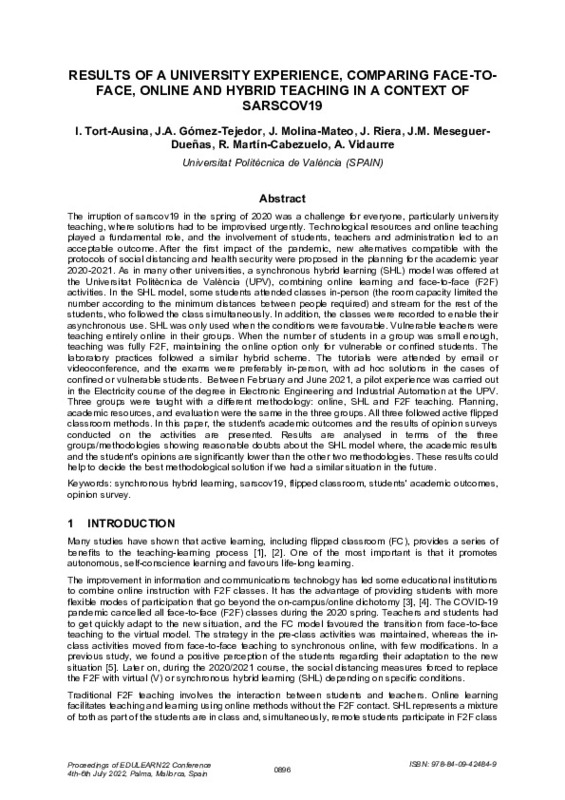JavaScript is disabled for your browser. Some features of this site may not work without it.
Buscar en RiuNet
Listar
Mi cuenta
Estadísticas
Ayuda RiuNet
Admin. UPV
Results of a university experience, comparing face-toface, online and hybrid teaching in a context of Sarscov19
Mostrar el registro sencillo del ítem
Ficheros en el ítem
| dc.contributor.author | Tort-Ausina, Isabel
|
es_ES |
| dc.contributor.author | Gómez-Tejedor, José-Antonio
|
es_ES |
| dc.contributor.author | Molina Mateo, José
|
es_ES |
| dc.contributor.author | Riera Guasp, Jaime
|
es_ES |
| dc.contributor.author | Meseguer Dueñas, J. M.
|
es_ES |
| dc.contributor.author | Martín-Cabezuelo, R.
|
es_ES |
| dc.contributor.author | Vidaurre, Ana
|
es_ES |
| dc.date.accessioned | 2023-01-13T07:22:10Z | |
| dc.date.available | 2023-01-13T07:22:10Z | |
| dc.date.issued | 2022-07-06 | es_ES |
| dc.identifier.isbn | 978-84-09-42484-9 | es_ES |
| dc.identifier.uri | http://hdl.handle.net/10251/191301 | |
| dc.description.abstract | [EN] The irruption of sarscov19 in the spring of 2020 was a challenge for everyone, particularly university teaching, where solutions had to be improvised urgently. Technological resources and online teaching played a fundamental role, and the involvement of students, teachers and administration led to an acceptable outcome. After the first impact of the pandemic, new alternatives compatible with the protocols of social distancing and health security were proposed in the planning for the academic year 2020-2021. As in many other universities, a synchronous hybrid learning (SHL) model was offered at the Universitat Politècnica de València (UPV), combining online learning and face-to-face (F2F) activities. In the SHL model, some students attended classes in-person (the room capacity limited the number according to the minimum distances between people required) and stream for the rest of the students, who followed the class simultaneously. In addition, the classes were recorded to enable their asynchronous use. SHL was only used when the conditions were favourable. Vulnerable teachers were teaching entirely online in their groups. When the number of students in a group was small enough, teaching was fully F2F, maintaining the online option only for vulnerable or confined students. The laboratory practices followed a similar hybrid scheme. The tutorials were attended by email or videoconference, and the exams were preferably in-person, with ad hoc solutions in the cases of confined or vulnerable students. Between February and June 2021, a pilot experience was carried out in the Electricity course of the degree in Electronic Engineering and Industrial Automation at the UPV. Three groups were taught with a different methodology: online, SHL and F2F teaching. Planning, academic resources, and evaluation were the same in the three groups. All three followed active flipped classroom methods. In this paper, the student's academic outcomes and the results of opinion surveys conducted on the activities are presented. Results are analysed in terms of the three groups/methodologies showing reasonable doubts about the SHL model where, the academic results and the student's opinions are significantly lower than the other two methodologies. These results could help to decide the best methodological solution if we had a similar situation in the future. | es_ES |
| dc.description.sponsorship | Authors would like to thank the Institute of Education Sciences of the Universitat Politècnica de València (Spain) for supporting the Teaching Innovation Group e-MACAFI and for the financial support through PIME Project PIME 20-21/220 and PIME Project PIME/2018/B25. | es_ES |
| dc.language | Inglés | es_ES |
| dc.publisher | IATED | es_ES |
| dc.relation.ispartof | Proceedings 14th annual International Conference on Education and New Learning Technologies (EDULEARN22) | es_ES |
| dc.rights | Reserva de todos los derechos | es_ES |
| dc.subject | Synchronous hybrid learning | es_ES |
| dc.subject | Sarscov19 | es_ES |
| dc.subject | Flipped classroom | es_ES |
| dc.subject | Students' academic outcomes | es_ES |
| dc.subject | Opinion survey | es_ES |
| dc.subject.classification | FISICA APLICADA | es_ES |
| dc.title | Results of a university experience, comparing face-toface, online and hybrid teaching in a context of Sarscov19 | es_ES |
| dc.type | Comunicación en congreso | es_ES |
| dc.type | Capítulo de libro | es_ES |
| dc.identifier.doi | 10.21125/edulearn.2022.0258 | es_ES |
| dc.relation.projectID | info:eu-repo/grantAgreement/UPV//PIME%2F20-21%2F220/ | es_ES |
| dc.relation.projectID | info:eu-repo/grantAgreement/UPV//PIME%2F2018%2FB25//Proyectos de Innovación y Mejora Educativa (PIME)/ | es_ES |
| dc.rights.accessRights | Abierto | es_ES |
| dc.contributor.affiliation | Universitat Politècnica de València. Escuela Técnica Superior de Gestión en la Edificación - Escola Tècnica Superior de Gestió en l'Edificació | es_ES |
| dc.contributor.affiliation | Universitat Politècnica de València. Escola Tècnica Superior d'Enginyeria Informàtica | es_ES |
| dc.contributor.affiliation | Universitat Politècnica de València. Escuela Técnica Superior de Ingeniería del Diseño - Escola Tècnica Superior d'Enginyeria del Disseny | es_ES |
| dc.description.bibliographicCitation | Tort-Ausina, I.; Gómez-Tejedor, J.; Molina Mateo, J.; Riera Guasp, J.; Meseguer Dueñas, JM.; Martín-Cabezuelo, R.; Vidaurre, A. (2022). Results of a university experience, comparing face-toface, online and hybrid teaching in a context of Sarscov19. IATED. 896-905. https://doi.org/10.21125/edulearn.2022.0258 | es_ES |
| dc.description.accrualMethod | S | es_ES |
| dc.relation.conferencename | 14th International Conference on Education and New Learning Technologies (EDULEARN 2022) | es_ES |
| dc.relation.conferencedate | Julio 04-06,2022 | es_ES |
| dc.relation.conferenceplace | Palma de Mallorca, Spain | es_ES |
| dc.relation.publisherversion | https://doi.org/10.21125/edulearn.2022.0258 | es_ES |
| dc.description.upvformatpinicio | 896 | es_ES |
| dc.description.upvformatpfin | 905 | es_ES |
| dc.type.version | info:eu-repo/semantics/publishedVersion | es_ES |
| dc.relation.pasarela | S\469384 | es_ES |
| dc.contributor.funder | Universitat Politècnica de València | es_ES |








